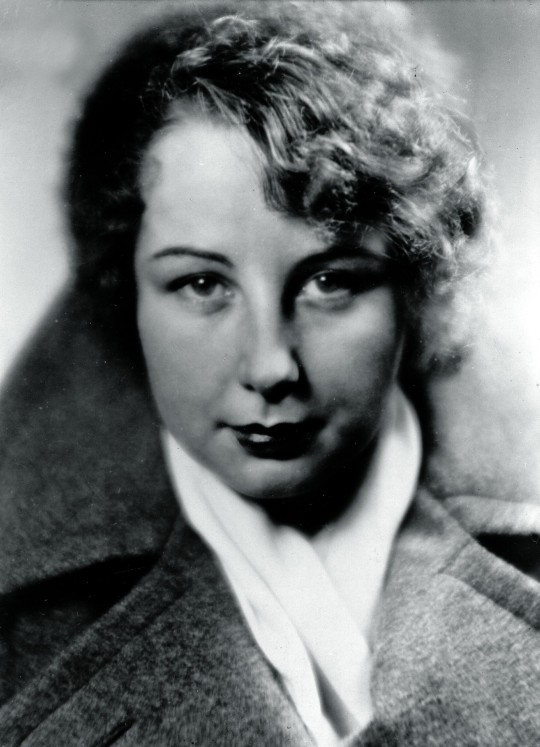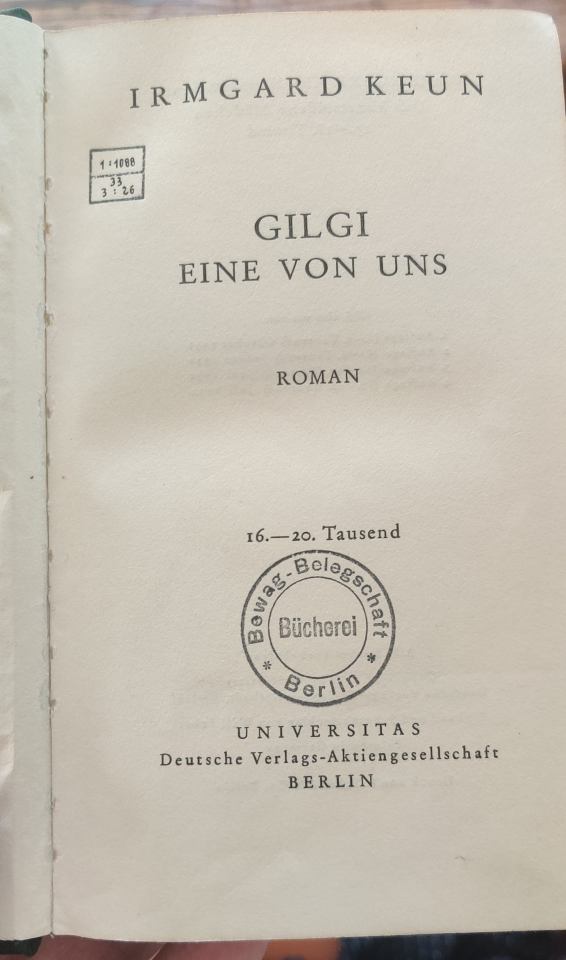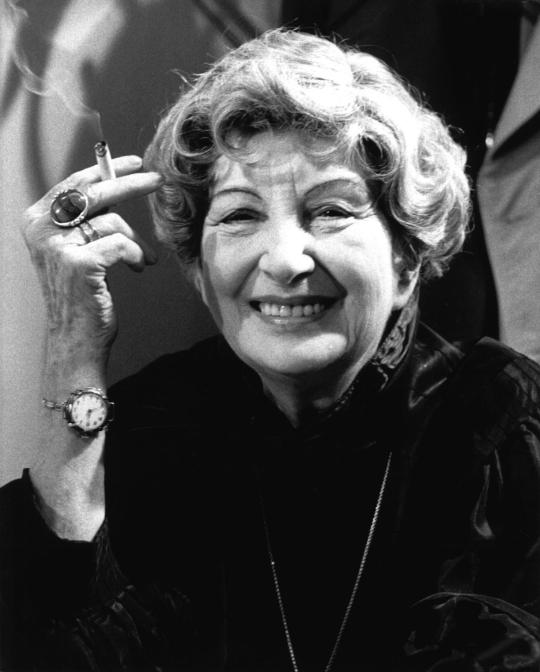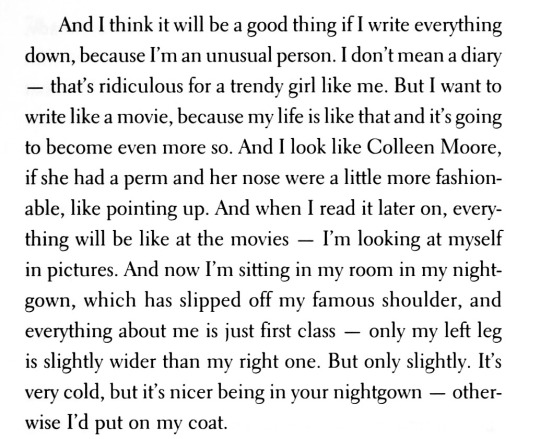#Irmgard Keun
Text
She was small and fair and delicate, like a Christmas fairy, all white and gold.
Irmgard Keun, After Midnight (1937)
#official card-carrying member of the nonexistent irmgard keun fan club 🩷#irmgard keun#after midnight#literature#marshmallow worlds
448 notes
·
View notes
Text

Irmgard Keun, from “After Midnight”
241 notes
·
View notes
Text
But popularity came with a price. The Artificial Silk Girl tells the story of a young woman in contemporary Berlin who resorts to prostitution and theft on her quest to become a cabaret star. The Nazis had come to power the same year the book was published and disapproved of it vehemently. As one critical reviewer wrote, Keun produced “vulgar aspersions against German womanhood,” which were quite incompatible with Nazi ideas of refinement. “Anything like an autonomous woman was anathema to the Nazis,” Hofmann observes. Accordingly, Keun was blacklisted.
Relevant. Highly relevant.
4 notes
·
View notes
Text
Ich wollte gut sein. Ich glaube, man fängt an, alles richtig zu machen, wenn man gut sein will. Und ich glaube, ich mache alles falsch, wenn ich immer nur will, daß andere gut sein sollen zu mir. Ich will geliebt werden, alle wollen geliebt werden, auf tausend Menschen, die geliebt werden wollen, kommt vielleicht einer, der lieben will. Vater unser .... mein Herz ist ein Klumpen Trauer.
Irmgard Keun, Nach Mitternacht
7 notes
·
View notes
Text
Das kunstseidene Mädchen von Irmgard Keun
#music#playlist#german music#the artificial silk girl#irmgard keun#das kunstseidene Mädchen#german#Germany#tender are the nights#1920s#Spotify#mine#playlists
3 notes
·
View notes
Text
Gilgi eine von uns

Forfatterinden Irmgard Keun skabte 30ernes unge tyske hverdags-heltinder.
Gilgi står op klokken 6:30 og gør morgengymnastik inden brusebadet: først det varme og så det kolde vand, mens hun tæller til tredive. Ikke for hurtigt! Hun kommer lidt Nivea creme på øjenbrynene, så får hun et rundstykke med smør og en kop kaffe af familiens egen forfærdelige blanding: 1/4 kaffebønner, en 1/4 cikorie 1/4 byg og 1/4 Karlsbader Kaffeerstatning. Faren i huset får som den eneste i familien et æg, mens han læser op af nyhederne fra Kölner Stadt-Anzeiger om blandt andet røveri i en smørforretning, nye fund af våbenlager og Biskoppen af Leitmetz, som netop var afgået ved døden.
Sådan indleder den unge tyske forfatter Irmgard Keun sin roman “Gilgi - eine von uns” - der udkom i 1931 og øjeblikkeligt blev en bragende succes. Bogen handler om Gilgi, der egentlig hedder Gisele, men det vil hun først hedde, efter hun er fyldt 25 år. Gilgi, er en af de 1,3 millioner kontormus med stenogram-blokke og Erika skrivemaskiner, der i mellemkrigstidens Tyskland forsøgte at gøre karriere og tjene til livets ophold i det tyske erhvervsliv. Gilgi bliver læsernes rollemodel for den nye unge frigjorte kvinde, som vil tage ansvar for sit eget liv. Gilgi ryger cigaretter og drikker alkohol og da hun forelsker sig bliver gravid (stop her hvis du selv vil læse bogen) vælger hun at forlade sin elskede, rejse til Berlin og klare sig selv, som enlig mor. Som Claire Waldorff sang i en samtidig revyvise: “Raus mit den Männern!”
Jeg er vild med bogen og Irmgard Keuns måde at skrive på. Hun skriver ikke blot en roman - hun rapporterer fra en virkelighed, som læserne kan genkende og som bliver bragt til live igen 91 år senere. Vi får at vide, at Gilgi bruger Nivea - ikke bare creme. Vi får ikke blot at vide, at familien bruger kaffeekstrakt, vi får at vide, at det er Karlsbader, og de nyheder Gilgi’s far læser op ved morgenbordet, er virkelige begivenheder. Biskoppen i Leitzmetz hed Joseff Gross og han døde faktisk den 20 januar 1931, så faderen i bogen læser formentlig op af Kölner Stadt-Anzeiger fra den 22. januar 1931 - det var en torsdag.

I et andet kapitel beslutter Gilgi sig for at opsøge, hvad hun tror, er hendes biologiske mor, som bor i Thieboldgasse, der er en virkelig gade. Man kan stadig på Google følge hendes vandretur fra Domstrasse gennem Köln. Bogen er et eksempel på den strømning, som opstod i 20′ernes Tyskland og blev kaldt “Die Neue Sachlichkeit” - ‘den nye faglighed’, hvor kunstnere og arkitekter skrællede pynten af overfladen og skildrede den virkelighed, de var en del af. Bogen er på alle måder moderne - dengang og idag.
Gilgi gjorde forfatteren Irmgard Keun berømt fra den ene dag til den anden. Bogen blev straks filmatiseret og Keun var hurtig på tasterne og fulgte op med endnu en bestseller roman om Doris i “Das Kunstseidene Mädchen”, der udkom i 1932.
Og så var det hele slut.
Nazisterne kom til magten og Irmgard Keun’s frigjorte unge kvindebilleder passede ikke de nye herskere. Hendes to bøger var blandt dem, der blev kastet på bålene i 30 universitetsbyer rundt om Tyskland i maj 1933 og Irmgard Keun selv måtte gå i eksil i Belgien. Efter krigen tog hun sit forfatterskab op igen, men hun nåede aldrig tilbage til sin ungdoms litterære højde, dengang hun ramte tidsånden mere præcist end nogen anden.
Irmgard Keun’s bøger er over årene blevet genoptrykt og genudgivet, men det eksemplar af “Gilgi, eine von uns”, som jeg fandt i et antikvariat i Düsseldorf og som jeg netop har læst, er den oprindelige udgave fra 1931, som, skjult på et bibliotek, undgik flammerne to år senere..

2 notes
·
View notes
Text
Jenny Erpenbeck für International Booker Prize nominiert
Jenny Erpenbeck hat es mit ihrem Übersetzer Michael Hofmann auf die Shortlist des International Booker Prize geschafft. Die Berliner Autorin ist in der englischsprachigen Welt sehr erfolgreich, manche sehen in ihr bereits die kommende Nobelpreisträgerin.
Die Autorin Jenny Erpenbeck hat es mit ihrem englischen Übersetzer Michael Hofmann auf die Shortlist für den International Booker Prize geschafft. Die Berlinerin ist in der englischsprachigen Welt äußerst erfolgreich, manche sehen in ihr bereits eine kommende Nobelpreisträgerin. Mit dem renommierten Preis wird der beste Roman aus dem nicht englischsprachigen Ausland ausgezeichnet.
Continue…

View On WordPress
#Alfred Döblin#Annie McDermott#Barbara Mesquita#Christian Hansen#David Diop#David Grossman#Durs Grünbein#Ernst Jünger#featured#Franz Kafka#Geetanjali Shree#Georgi Gospodinov#Hang Kang#Hans Fallada#Herta Müller#Hwang Sok-yong#IA Genberg#International Booker Prize#Irmgard Keun#Itamar Vieira Junior#Jenny Erpenbeck#Jente Posthuma#Johnny Lorenz#Jokha Alharthi#Joseph Roth#Kira Joseffson#Lucas Rijneveld#Michael Hofmann#Olga Tokarczuk#Sarah Timmer Harvey
0 notes
Text
It's like reading a wonderful poem, and learning it off by heart because you like it so much and you want to be able to recite the whole thing. And when you do know it off by heart you can slowly begin to forget it again. Which is what people generally do.
AFTER MIDNIGHT by irmgard keun
#after midnight#irmgard keun#german literature#wwii literature#germany#new objectivity#neue sachlichkeit#remembering#forgetting#temporality
1 note
·
View note
Text
Irmgard Keun
https://www.unadonnalgiorno.it/il-peggio-e-che-a-questa-gente-e-stato-sottratto-ogni-senso-di-responsabilita/

Miseria e povertà forse non sono neanche il peggio. Il peggio è che a questa gente è stato sottratto ogni senso di responsabilità. Il peggio è che alcuni di loro si sentono quasi a proprio agio nell’io non posso farci niente, si adagiano nell’idea che la loro miseria sia soltanto colpa di altri come fossero chiusi in una bara. Assassinano la virtuosa consapevolezza della loro pigrizia e imperfezione, lasciano che la voglia di vivere e la forza di desiderare, muoiano lentamente dentro di loro, non possono certo farci nulla. E se l’effettiva colpa altrui copre un minuscolo granello della loro colpa, forse quello è il peggio, quella è la fine, quello vuol dire essere morti.
Irmgard Keun è stata una scrittrice tedesca, autrice di sceneggiature, reportage e una dozzina di romanzi in cui ha raccontato le contraddizioni della società europea prima e durante la Seconda guerra mondiale, concentrandosi in particolare sulla storia delle donne.
Nata il 6 febbraio 1905 a Charlottensburg, che all’epoca separata da Berlino è cresciuta a Colonia dove si è diplomata in una scuola femminile evangelica nel 1921.
Diventata attrice, dopo aver frequentato l’accademia d’arte drammatica, pagata col suo lavoro di dattilografa, aveva raggiunto anche un discreto successo quando, nel 1929, decise di dedicarsi completamente alla scrittura, spronata dall’amico scrittore Alfred Döblin con cui condivideva la forte critica verso la società.
All’inizio degli anni Trenta, i suoi Gilgi, una di noi e Doris, la ragazza misto seta, la trasformarono in un caso letterario rendendola una celebrità internazionale. Riscosse un tale successo che ci fu chi gridò al plagio, una donna così giovane non poteva aver scritto un libro di così vivida intelligenza sociale.
Le prime opere già trapelano la spinta di emancipazione che ha percorso tutta la sua poetica, irriverente, istintiva, libera, come ella stessa. La sua critica moderna verso la condizione femminile, che aveva trovato successo e traduzioni anche all’estero, portò alla censura da parte del partito nazionalsocialista. La condanna della messa al bando dei suoi romanzi le costò caro, venne costretta, dal fisco tedesco, a pagare l’intero ammontare delle copie pubblicate anche se giacevano, invendute dal suo editore.
In tutta risposta fece causa allo Stato, per questo venne arrestata e rilasciata dietro un’ingente cauzione. Interrogata e intimidita dalla Gestapo, decise di abbandonare la Germania per un esilio durato dieci anni in giro per l’Europa.
Nel periodo della clandestinità ha continuato a scrivere e vissuto un’intensa e devastante storia d’amore con lo scrittore Joseph Roth. Una relazione fatta di scrittura, passione, forti contrasti, viaggi e fiumi d’alcol, bruciata in un paio d’anni.
Per rientrare in Germania, nel 1940, con la complicità di un amico giornalista, fece circolare la notizia che si era suicidata. E mentre il pubblico di lettori e lettrici leggeva piangeva la sua precoce morte, visse in clandestinità con un nome falso.
L’impeto letterario, spinto da una situazione di totale inquietudine, spinse Irmgard Keun a scrivere due romanzi come After Midnight e Child of All Nations due fotografie della vita in Germania durante il nazismo: un tentativo spietato di immortalare la quotidianità drammatica degli anni di guerra.
Ma le complesse circostanze storiche determinarono in lei uno stato d’animo di disperazione.
Nel corso dei decenni il suo romanzo Doris la ragazza misto seta è stato tradotto in più di sedici lingue e, nel 1960, il regista francese Julien Duvivier ne ha tratto il film La gran vita che ha visto come protagonista Giulietta Masina.
Afflitta da problemi psichici, economici e dipendenza da alcol, ha lavorato come giornalista, ha scritto sceneggiature e si è riaffacciata al teatro, ma senza più alcuna stabilità né professionale né emotiva che la spinse sempre di più verso il baratro.
Dal 1966 al 1972 è stata ricoverata in un ospedale psichiatrico, una volta uscita, viveva in un monolocale con precarie aspettative mentre tutti sembravano essersi dimenticati dell’irriverente scrittrice femminista della Repubblica di Weimar.
Si è spenta, in solitudine e povertà, a causa di un cancro ai polmoni, il 5 maggio 1982 a Colonia.
La critica che l’aveva ignorata per tutti gli anni settanta, l’ha rivalutata negli ultimi decenni e i suoi libri hanno ripreso a essere tradotti in tutto il mondo.
Vorrei una notte di musica e lanterne e danze, voglio tutto, lo voglio subito, me la divorerei questa vita, fino allo sfinimento, come se domani dovessi morire e non potessi godermi più niente.
0 notes
Text
I want to become a star. I want to be at the top. With a white car and bubble bath that smells from perfume, and everything just like in Paris.
— Irmgard Keun, The Artificial Silk Girl (1932)
#the english speaking world needs to get it together and stop sleeping on the queen that is irmgard keun#she FAKED HER OWN DEATH to escape the nazis!#i need a miniseries!#the artificial silk girl#irmgard keun#literature
300 notes
·
View notes
Text
not me getting a specific edition of a book from 1979 for reference purposes
#apparently they can sell for around 60€ if they are in good condition - didn't even suspect#found one that is hopefully alright for 15#let's see#plus i got myself a used copy of a certain novel by irmgard keun#let's see if it is any good!#yay me reading more and buying books for dumb reasons lol
5 notes
·
View notes
Text

Irmgard Keun has already written my manifesto for me—how convenient!
42 notes
·
View notes
Text

irmgard keun, nach mitternacht
1 note
·
View note
Text
got tagged four times, so i thought it was about time i crawled out of the woodwork and did this! thanks, @godotismissingx, @akingyouniverse, @pashminabitch & @idrilka 💙
Rules: Answer all the questions, then tag 9 people you want to get to know better!
Three ships: i'm a seon-ho multishipper but if i had to choose then it would be bangseon (yi bang-won/nam seon-ho, MCTNA); sephcloud (sephiroth/cloud strife, FF7); balthorki (baldr/thor/loki, Marvel/MCU); as a bonus: heavar (heahmund/ivar, Vikings)
First ship: i think it might have been sasunaru lol
Last song I listened to: Labour by Paris Paloma
Last movie I watched: it's still The Divine Fury (haven't gotten around to watching The Handmaiden yet, but i hope to soon! /o\)
Currently reading: not really reading anything right now... though i guess i recently got Fire & Blood by George R. R. Martin. also meant to start reading Gilgi - eine von uns by Irmgard Keun soon beyond the sneak peek i already got (folks, is it gay to call your girl best friend "Marzipanmädchen" and dreamily think of her as romance itself in the era of the "Neue Sachlichkeit" that eschews romance and sentimentality of any kind???).
Currently watching: i gave in to the urge and finally started watching House of the Dragon (hence why i got Fire & Blood). alicent hightower is my poor little meow meow who is surrounded by creeps and has sapphic longing for her childhood friend/first love turned enemy and can do no wrong
Currently consuming: water - remember to stay hydrated, everyone!
Currently craving: savory puff pastries or há cảo 🤤
Tagging @illwynd, @pyrebomb, @argents-huntress, @hedvig-ulrika, @sadviper, @rain-hat, @nubreed73, @lilsjames, @fuckingfeatherine, @blueberry-cheese-pizza, @springkitten, @contagiousrhythminmybrain, @lvsifer, @noona96n, @strandedchesspiece, @bienmoreau, @cumberbatchedandproud, @laireshi, @judiwench, @itsza, @yohankang, @radialarch, @convenientalias, @avauntus and anyone else who wants to do it!
#godot#ko#pashminabitch#idrilka#meme#tag meme#as usual no pressure#tagging = a friendly nudge#a 'hey i still think of you fondly'#to those i haven't talked to in a while#bc i'm a human disaster lol#also after watching hotd i don't understand how anyone can hate either the greens or the blacks#both alicent and rhaenyra are so cool#daemon too#luce is so baby and aemond is my psycho baby#we all have our natural faves and preferences#but honestly all the characters are so interesting#edit: oops i think you already tagged me for this meme too nubreed though that was months ago#thank you for thinking of me too <333
20 notes
·
View notes
Text
Books I've read in 2023
'Crying in H Mart' by Michelle Zauner
'The Tea Dragon Society' by K. O'Neill
'A Certain Hunger' by Chelsea G. Summers
'How to Break Up with Your Phone' by Catherine Price
'The Metamorphosis' by Franz Kafka
'Animals Eat Each Other' by Elle Nash
'Coming Out Autistic' edited by Steven Fraser
'The Very Secret Society of Irregular Witches' by Sangu Mandanna
'We Swim to the Shark' by Georgie Codd
'Passing' by Nella Larsen
'The Service' by Frankie Miren
'What I Want to Talk About: How Autistic Special Interests Shape a Life' by Pete Wharmby
'The Inland Sea' by Madeleine Watts
'Mating in Captivity: Reconciling the Erotic and the Domestic' by Esther Perel
'Let Them Eat Chaos' by Kae Tempest
'Introducing Existentialism' by Richard Appiganesi
'The Silence Project' by Carole Hailey
'Cursed Bunny' by Bora Chung
'Sunshine' by Melissa Lee-Houghton
'The Delicacy' by James Albon
'Are Prisons Obselete?' by Angela Y. Davis
'The Beginning of the World in the Middle of the Night' by Jen Campbell
'Square Eyes' by Luke Jones and Anna Mills
'Chess Queens: The True Story of a Chess Champion and the Greatest Female Players of All Time' by Jennifer Shahade
'Making Cocoa for Kingsley Amis' by Wendy Cope
'The Housekeeper and the Professor' by Yōko Ogawa
'The Artificial Silk Girl' by Irmgard Keun
'Because Internet: Understanding the New Rules of Language' by Gretchen McCulloch
'Esc & Ctrl' by Steve Hollyman
'The Doors of Perception' by Aldous Huxley
'Sedating Elaine' by Dawn Winter
'Different, Not Less: A Neurodivergent's Guide to Embracing Your True Self and Finding Your Happily Ever After' by Chloé Hayden
'The Appendix' by Liam Konemann
'Food Isn't Medicine: Challenge Nutrib*llocks & Escape the Diet Trap' by Dr Joshua Wolrich
'Didn't Nobody Give a Shit What Happened to Carlotta' by James Hannaham
'Lies We Sing to the Sea' by Sarah Underwood
'Julia and the Shark' by Kiran Millwood Hargrave with Tom de Freston
'Who Will Run the Frog Hospital?' by Lorrie Moore
'Disability Visibility: First-Person Stories from the Twenty-First Century' edited by Alice Wong
'This Is How You Lose the Time War' by Amal El-Mohtar and Max Gladstone
'Small Bodies of Water' by Nina Mingya Powles
'The Cassandra Complex' by Holly Smale
'French Exit' by Patrick deWitt
'Sundial' by Catriona Ward
'Don't Hold My Head Down: In Search of Some Brilliant Fucking' by Lucy-Anne Holmes
'Girl, Woman, Other' by Bernardine Evaristo
'The Love Factor' (So Little Time #8) by Rosalind Noonan
'Paris: The Memoir' by Paris Hilton
'All Systems Red' (The Murderbot Diaries #1) by Martha Wells
'Intimations' by Zadie Smith
'Cultish: The Language of Fanaticism' by Amanda Montell
'Motherthing' by Ainslie Hogarth
2 notes
·
View notes
Text
they didn't have any poetry books at my second hand bookstore so i went to another bookstore which usually have lots of poetry books but i couldn't find any i like and i wasn't planning on buying books but i overheard the owner saying he might have to close bc business isnt good and i got so sad it's my fave bookstore bc there's books there you won't find anywhere else and you can tell the owner knows his job and loves doing it, so i did buy books to please him, and when i handed them to him to pay, he looked at what i chose (woolf, plath, irmgard keun, djuna barnes) and then looked back at me and said "oooooh i see the type" 😭??? and then proceeded to talk about monique wittig
4 notes
·
View notes